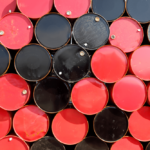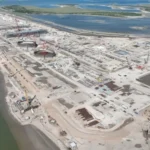Energy News Beat
The eagerly anticipated African Energy Bank will launch by June 30 after selecting a host nation this month and hopes to raise an initial $5 billion from African signatories, international financiers and Middle Eastern states, its head told S&P Global Commodity Insights.
Formed out of a partnership between the African Petroleum Producers Organization (APPO), which represents the continent’s petrostates, and the African Export-Import Bank (Afreximbank), the institution hopes to fund oil and gas projects on the continent amid a damaging financing squeeze in recent years.
In an interview on the sidelines of an energy conference in Accra, Ghana on March 12, Omar Farouk Ibrahim, APPO’s secretary-general, said “a number of investors and countries in the Middle East that believe that the oil and gas industry has a future” were “waiting in the wings” to supply financing.
The institution’s headquarters will be selected by the end of March, he said, with six member states including Ghana jostling for host status. Mohamed Aoun, Libya’s oil minister, is chairing the committee to select the headquarters, which met virtually March 11.
Matthew Opuko Prempeh, Ghana’s energy minister, told S&P Global that Ghana was one of the only countries that fulfilled all the criteria, adding that site visits had already taken place.
“We have already started receiving funds from our member countries,” Ibrahim said. “By the end of this month we expect a decision on who will host the headquarters. By 30th June we expect the bank to be set up.”
Sources speaking on condition of anonymity told S&P Global that only Nigeria and Angola had so far supplied initial funds to the project, at around $20 million each. The bank is seeking $83 million from each of the 18 signatories, amounting to almost $1.5 billion.
Once set up, the bank will be able to fund oil and gas projects in Africa, despite Western financing drying up in recent years due to the global shift away from fossil fuels.
“The whole idea of establishing the African energy bank stems from the realization that those on whom Africa has been depending for the last 70-100 years for finance to explore, produce and process its oil and gas have been essentially Western and they have decided as a result of the global paradigm shift towards renewables to end fossil fuel funding, particularly in Africa,” said Ibrahim.
Afreximbank has emerged as a leader in hydrocarbon project funding recently, but Ibrahim said that caused issues among some of its shareholders.
“Afreximbank cannot continue the way it is, funding oil and gas projects. There is a lot of pressure on it from other investors in the bank who do not share the vision. By partnering with us they have excised everything about oil and gas from their portfolio,” he said. “Financers of Afreximbank are not just Africans or people who share our vision.”
Global demand
In the wide-ranging interview, Ibrahim — a former Nigerian OPEC governor — said OPEC membership still makes sense for African countries, despite Angola’s departure in January following a dispute over its production quota.
“I think OPEC has been a blessing to the oil industry. It is impossible for every country to say it has got everything it needs or wants but collectively I think the decisions of the organization have been very helpful for the economies of these countries.”
The APPO secretary-general also remains bullish about global oil demand in the coming decades, despite predictions of peak oil in 2030 by the International Energy Agency.
“We are convinced that oil demand will not be what the IEA and other climate activists have been telling the world in the last few years, that we are coming to a peak,” Ibrahim said. “The fact is the global population is increasing, cities are growing, and this will require a lot of energy.”
He said the focus in Africa should now shift away from exporting oil and gas to wealthy nations in Europe and elsewhere and towards domestic consumption. Many African producers, including Nigeria, Angola and Ghana, export their oil and import refined products, hitting foreign exchange, slowing industrialization and leaving them vulnerable to price volatility.
“We export 75% of our oil and 45% of our gas, not because we don’t need it but because we get big money selling it internationally,” Ibrahim said. “The point we are making is, give access to the people for energy and they will transform the economy. Exporting hasn’t worked and it won’t work.”
Take the Survey at https://survey.energynewsbeat.com/
ENB Top News
ENB
Energy Dashboard
ENB Podcast
ENB Substack
The post Oil-focused African Energy Bank eyes June launch as first funds trickle in appeared first on Energy News Beat.








